Jason And The Argonauts (1963)
Directed by: Don Chaffey
Written by: Beverley Cross, Jan Read
Starring: Nancy Kovack, Todd Armstrong
HCF REWIND NO.126: JASON AND THE ARGONAUTS [UK 1963]
AVAILABLE ON DVD AND BLU-RAY
RUNNING TIME: 98 min
REVIEWED BY:Dr Lenera, Official HCF Critic
Pelias usurps the throne of Thessaly by storming the palace of King Aristo and killing him, but is told a prophecy that he will be overthrown by a child of Aristo wearing one sandal. In an attempt to thwart the prophecy, he kills one of Aristo’s daughters, angering the goddess Hera. Twenty years late, Jason saves Pelias from drowning, but loses a sandal so that Pelias recognises him. Thessaly is a now a poor and beleaguered land under Pelias, and Jason means to obtain the legendary Golden Fleece to let the people know the gods have not forsaken them. Jason recruits heroes from all over Greece to join him on his dangerous voyage, but amongst them is the treacherous son of Pelias, Acastas….
I think that most people will say that Jason And The Argonauts is Ray Harryhausen’s best film [strange isn’t it that, although the special effects genius didn’t direct or star in, and only partially wrote, his movies, they are still considered ‘his’]. Ray certainly thinks so and I agree, with Clash Of The Titans and either The 7th Voyage Of Sinbad or The Golden Voyage of Sinbad [I can never decide which I like best, the former is more fun and exciting but the latter more mature and detailed] second and third place. Jason And The Argonauts sees Harryhausen at the peak of his powers, reaching a level of near-perfection which he never quite managed again. It’s full of awesome thrill sequences which are still spellbinding to watch. It also has a decent and even sometimes witty script which while, as in all of Harryhausen’s pictures, is there first and foremost to act as the glue with which to stick his effects set-pieces together, has also been quite intelligently thought through. The acting?…..well, nobody goes to see these films for the acting anyway, but it is perfectly fine except for, perhaps sadly, the two main leads.
The original idea that Harryhausen and his producer Charles H. Schneer had was to film the Greek legend of Perseus. They decided that it presented too many problems, so they opted to do the story of Jason and the Golden Fleece instead, though of course two decades later the former became Clash Of The Titans. Some of the ideas in early treatments are odd; Sinbad [despite living centuries later] was going to join Jason in his quest, the film was going to open and close in modern times where some tourists at a Greek temple are related the story of Jason, and, in scenes which seem, influenced by The Odyssey, Jason was going to go to the underworld and also encounter Scylla a many-headed monster and Charybdis a huge whirlpool. The film was shot mostly on location in Italy amongst the many Greek ruins there. Once, they were shooting a scene where the ship The Argo was going to appear from behind a rock when, instead, the Golden Hinde, Francis Drake’s ship appeared, because another crew were filming the Sir Francis Drake TV series and their ship was faster than Jason’s.Jason And The Argonauts was the first Harryhausen film to never be shown as part of a double-bill, though it wasn’t quite the hit expected, possibly because cinemas had been saturated with Italian-made mythological movies which were rarely much good [though there were exceptions, like Mario Bava’s Hercules At The Centre Of The Earth] and tended to focus most of the muscularity of their body-building stars.
Jason And The Argonauts opens with a brief battle scene that employs some shots from Helen Of Troy, but if you think that sounds bad, the footage isn’t noticeable unless you have seen the other film a few times, and anyway all of Harryhausen’s films, except Clash Of The Titans, only had moderate budgets, which explains the lack of major stars [though if you think about the films did have major stars, even if their screen time was brief –the creatures]. The next twenty minutes or so set up the story, and I’ve read that the early part of the film is too slow, but after recently sitting through, for example, the third Pirates Of The Caribbean film again, this certainly is not the case. The scenes are crisp and to the point, and the script does follow the original myth as closely as one could expect. Once our heroes set out on their voyage, things do move away from the source material, but they would not been able to get away with things like the iron man Talos burning people by heating himself up and embracing them, and rotting corpses coming out of the ground. Of course today it wouldn’t be a problem, and I think that the only way a new film of the story [which is mentioned from time to time], considering the greatness of the 1963 version, would totally justify itself would be one that would stay closer to the myth, something which the lousy Clash Of The Titans remake sadly failed to do.
So it’s a bit of a build-up to the really good bits, but not a dull one. The main characters are nicely sketched and are even made more believable in some cases, especially Hercules, who here, rather than being a super-strong muscleman, is more normal in build and also a bit of an idiot. Beverley Cross’s script nicely sets out the relationship of the gods to humans, the immortals basically using the mortals as pieces in a cosmic chess-like game, and gives us the lovely notion that the gods know that their time is ending because people are starting to stop believing in them. There is great chemistry between Nail MacGinnis’ s playful but somewhat cruel Zeus and Honor Blackman’s regal but subtly emotional Hera, constantly trying to get the better of the other while still sharing a kind of love, and this gives a real sense of gods and goddesses as the way they were usually conceived; as exaggerated versions of humans with all their flaws magnified. Isn’t that far more interesting than a deity who is perfect in every way?
So Jason and crew reach the Isle of Bronze, and the first thing they have to battle is Talos, a huge metal giant. The build-up to this scene really shows up Don Chaffey as being easily the best of Harryhausen’s directors as he films Hercules and his companion Hylas entering a valley filled with bronze statues usually from very high or very low angles. Talos comes to life in a really uncanny bit where we have a low-angle shot of the giant kneeling on a pedestal, then slowly his head, accompanied by grating metallic sounds, turns to look down at Hercules and Hylas walking away. The following action sequence is a brilliantly thrilling set-piece with matting and compositions that, apart from a couple of shots, are nearly perfect and better than much of the CGI stuff you see today, while all throughout Chaffey enhances everything with superb use of odd angles. The highlight is probably when Talos picks up the Argo and shakes everyone out of it, but for me the most perfect bits are when Talos is approaching from behind cliffs and you can see people running, or pointlessly trying to fight, in the foreground, in shots which are almost seamless.
Talos dies, as he has to, and as with many Harryhausen creatures he dies with sympathy, you feel rather sorry for him, but we then get to the Harpies, and the bat-winged devils are a bit different from the feminine figures in the myth, but never mind, this sequence features some of Harryhausen’s most intricate work as the two demons, sent by Zeus to pester the blind man Phineas who has offended him, pull from him his stick, belt and cloak. How painstakingly difficult this must have been to get the animation and the ‘real’ action to match, and yet it does perfectly – I defy anyone to see the joins. After this is the spectacular bit of the huge merman Triton holding apart from Clashing Rocks so the Argo can sail past them, and for this scene they used an actual person. The matting doesn’t convince quite as much here, so they came up with the ingenious idea of shooting most of the scene with high-speed photography, which particularly enhances the splashes of water and makes the whole thing seem a bit dreamlike. Next, after a decent sword duel on the ship [no, it’s not super-skilled swordplay, but the clumsiness is perhaps more believable], a short rest at the kingdom of Colchis where the Golden Fleece is, and a brief [and, to be honest, not too well-written, but it’s in the myth] romantic element where Medea the daughter of the king falls for Jason [oddly, she tells him she loves him but he doesn’t say anything similar back], we get to the grotto where the fleece is, and, in a very ‘outdoorsy’ film reliant much on real locations, we have a beautifully atmospheric set with the light from the fleece bathing the surroundings in unusual colours.
So now it’s the Hydra, actually a monster Hercules battled, but Harryhausen had done a more conventional dragon in his first Sinbad film, so the seven-headed Hydra it is, a creation for which more than thirty separate movements often had to be synchronized for every frame of film. And then….then….we get to the skeleton fight where Jason and two companions battle seven living skeletons, a scene which builds on the Sinbad/skeleton duel in The 7th Voyage Of Sinbad. This is, quite simply, one of the greatest special effects scenes in any film, a simply astounding achievement which took Harryhausen six months to create [for around three minutes of screen footage], but it’s also amazing cinema; exciting, visually unique, a bit unnerving, and even occasionally funny. Watching the scene yet again, what most strikes me is its sheer agility, the way the scene moves and is never static, never giving you time to think: “ummm, that shot looks a bit fake”. It is matchless cinema which will never date.
And then….the film suddenly ends, with Zeus saying he has further adventures for Jason and the dastardly Pelius still in charge of Thessaly. Actually, a sequel was planned, but never made, possibly because of the commercial disappointment of the film, and possibly because drastic changes would have had to be made to the original stories i.e.Medea chopping her children into bits! A shame. Todd Armstrong, though quite well dubbed, isn’t an interesting hero, but he doesn’t really need to be; in these stories, it’s often best for the hero to be an almost-bland, upstanding type around which all the interesting stuff revolves. It’s a shame that Nigel Green’s amusing Hercules exits the story too early, but that’s what he did in the myth. Jason And The Argonauts is splendidly enhanced by Bernard Herrmann’s score, which interestingly dispenses with any strings. His rousing main theme is as great an anthem for sea adventure as has ever been written. The many imaginative devices used to musically describe the special effects scenes are astounding, from the jabbing patterns for the Harpies to the mad orchestral dance for the skeletons. It’s a great and diverse score, though Herrmann was both rushed in doing the score and unhappy that the music budget was cut, so he resorted to recycling previous material he had written in a few places.
In the end, Jason And The Argonauts is not a great masterpiece of cinema, and from what I’ve read it would have been better if the budget had been higher and they could have shot all the stuff they wanted. But it’s still a thoroughly engrossing piece of entertainment, probably the greatest Greek mythological movie, and showcases the work of one of my cinema heroes at its very best, pure screen magic whose spell will never fade.
Rating: 










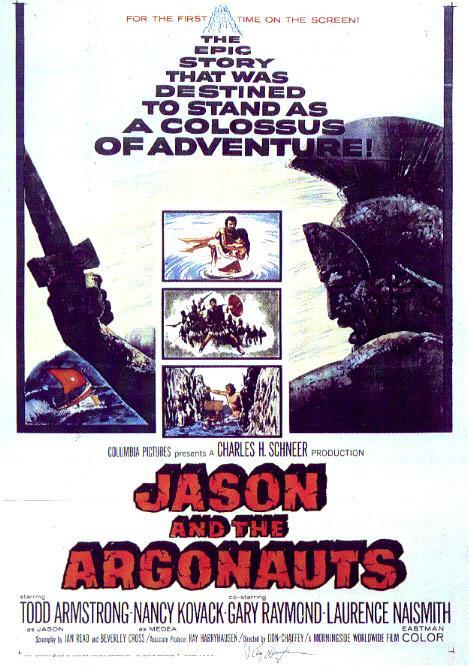
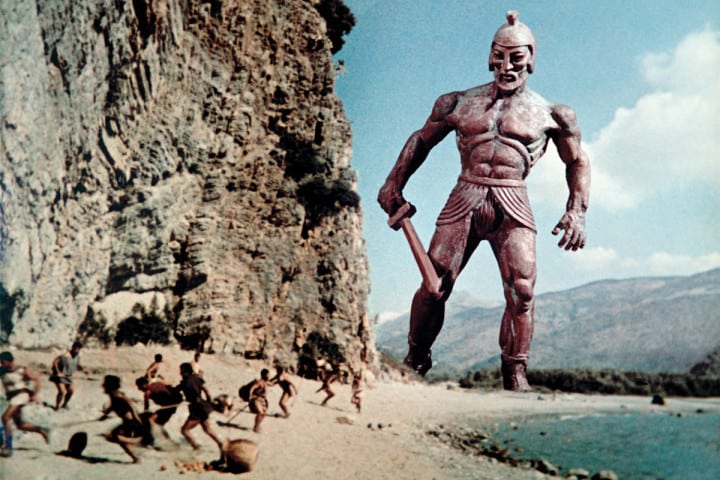
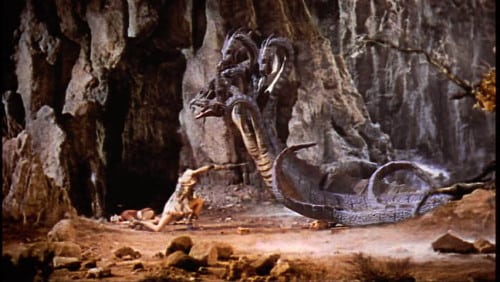


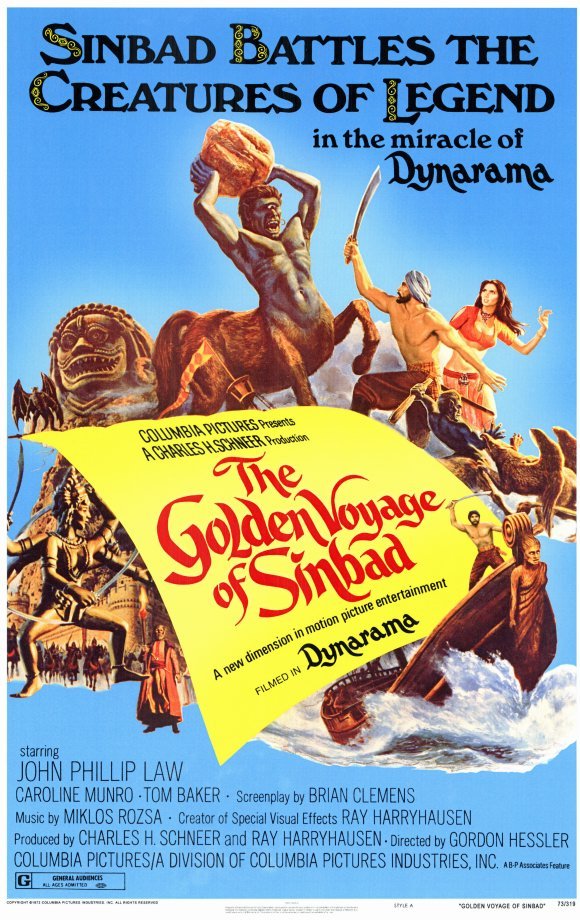
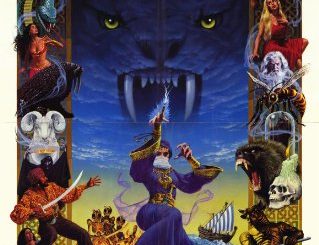
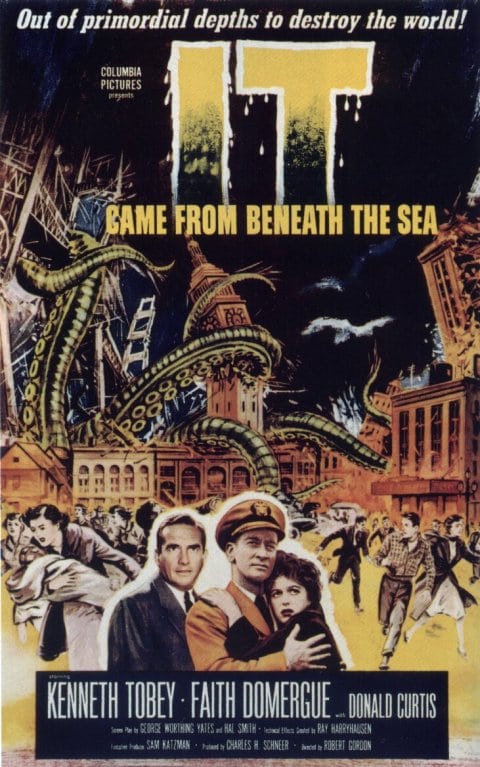
Classic adventure film. Love this so much